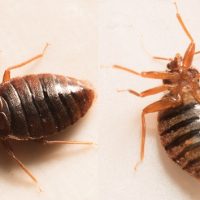
 iStock/Thinkstock(NEW YORK) — The rise of bed bugs in the last few decades may be due in large part to the their ability to resist insecticides used to kill them.
iStock/Thinkstock(NEW YORK) — The rise of bed bugs in the last few decades may be due in large part to the their ability to resist insecticides used to kill them.
Exterminators have turned to new chemicals to combat the pest, but a new study finds that bedbugs are showing resistance to these insecticides as well.
In light of this, the best approach to getting rid of bed bugs should include “physical, mechanical, and cultural control measures” such as traps and mattress encasements in addition to insecticides, a new study concludes.
The study published in the Journal of Economic Entomology found that bed bugs are showing a lower susceptibility to two common pesticides containing either containing chlorfenapyr or bifenthrin.
“No one was looking at if bedbugs were resistant to [those]forms of insecticide,” corresponding author Ameya Gondhalekar, an assistant professor Entomology at Purdue University, told ABC News.
To assess if bedbugs are becoming more resistant to insecticides containing chlorfenapyr or bifenthrin, researchers tested 10 different populations of bed bugs from across the country. As a control, researchers used a specific bed bug strain that is known to be susceptible to the insecticides being tested.
Researchers tested the effects of both pesticides on each of the 10 field strains, then compared each to the control.
They examined how much insecticide it took to kill each strain of bed bug and how long it took for the bed bugs to die once they were exposed. Researchers found that the concentration needed to kill bed bugs was higher in one of the test populations when compared to controls.
The control bed bugs died after seven days of exposure to chlorfenapyr and after three days of exposure to bifenthrin.
But it took more than seven days to kill the 10 test populations of bed bugs from around the country when they were exposed to chlorfenapyr. It also took more than three days to kill all the test populations when exposed to bifenthrin.
Gondhalekar said that the findings don’t mean the insects are unstoppable.
“The big message is that you should not rely on insecticide only, but use a multitude of options,” he said. “Regular monitoring and detecting infestation early” to help keep any outbreaks from spiraling out of control is important.
The study recommends a combined chemical and non-chemical approach to bed bug infestations that could include traps, hot steam, physical removal and mattress encasements.
Copyright © 2017, ABC Radio. All rights reserved.















